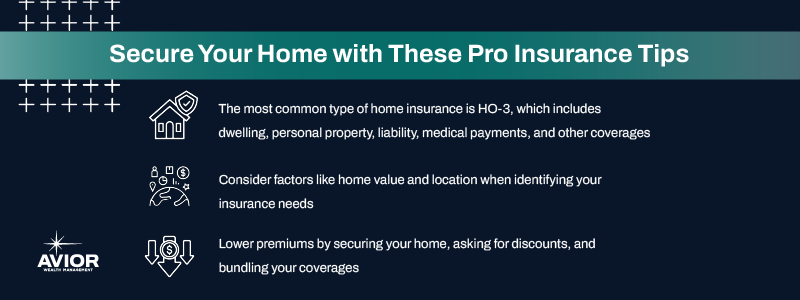Secure Your Home with These Pro Insurance Tips
Rest assured that your home and belongings are protected with the right insurance policy.

Insurance costs are some of the most important line items in your budget. Health and auto insurance are priorities, but home insurance is another expense that should top the list. You need adequate coverage if something happens to your home and possessions, but you don’t want to pay too much.
Selecting the right home insurance policy can be a big challenge for homeowners. Understanding policy options and best practices will help you choose the right home insurance coverage that meets your needs. Find out how to incorporate practice tips to empower you to make informed insurance decisions.
Standard types of home insurance coverage
The most common type of homeowners’ insurance policy is HO-3 insurance, which covers all aspects of your house’s structure, possessions, liability, healthcare payments, and some living costs.
Note that this coverage usually doesn’t include flood or earthquake damage. However, it does cover certain “perils,” such as fires, theft, vandalism, windstorms, water damage (accidental), frozen pipes, snow or ice storms, or explosions.
Let’s look at a few terms you need to know when navigating your policy options:
- Dwelling coverage: This covers repair costs related to the home’s structure, including the foundation and the interior.
- Personal property: This refers to any of your possessions that aren’t part of the home’s structure, including home appliances, furniture, valuables, and other belongings.
- Other structures: If you have other buildings or structures as part of your home, like a garage or shed, this could be covered under your home insurance plan as well.
- Liability: If something happens to your property, and someone is injured or their things are ruined, you could be liable for that damage. This is where liability insurance coverage comes into play, helping you cover those costs.
- Medical payments: If someone is injured in your house, this coverage will help you pay for their medical costs related to the injury.
- Additional living expenses: If your home was damaged and you had to live elsewhere while it was fixed, your additional living expenses coverage would help you pay for costs like hotels and food.
So, under an HO-3 plan, if your home experiences normal wear and tear, the policy will likely not cover those costs, nor if you failed to maintain the home and thus experienced expensive issues. However, if there is a fire or the weight of snow or ice causes damage, your coverage would help you pay for costs.
How to assess your home insurance needs
The kind and amount of coverage you’ll need depends on a few factors. One major one is location. If you live in an area of the country with a lot of snowfall and winter storms, you’ll need coverage for those kinds of damages. Those coverages will be a priority if you live in an area that gets tornados or hurricanes.
Another factor is home value. This means assessing how much the home is worth in addition to the total value of your possessions and valuables that could get damaged in a disaster.
Consider each factor carefully. It’s important to invest in the right coverages for your asset value and location so you will be protected if something happens.
Tips for lowering home insurance premiums
Once you know the must-have coverages, it’s time to review policies and pricing. How do you find the right option while ensuring reasonable insurance premiums? Here are a few important tips:
- Review several provider options: It’s wise to avoid going with the first insurance carrier you find. Shop around to see prices and where you can get the best deal.
- Improve home security: Besides making your home safer, installing additional security features can help you save on premiums. Many providers offer discounts for improvements like alarms, smoke detectors, or advanced locks.
- Bundle your policies: Some insurance carriers offer discounts when you bundle your coverages. For instance, you could combine auto and home insurance, make one payment for both, and save money.
- Increase deductibles: Premiums and deductibles can be trade-offs. If you increase your deductible – the amount you must pay before coverage kicks in – your monthly premiums could be lower.
- Ask about deals: Inquire about any offers and deals with the carriers you approach, and ask around. You could qualify for a discount that you’re not aware of.
Your goal should always be to get adequate coverage for your home. But with these simple hacks, you can lower your premium while maintaining a strong policy.
Keeping your policy updated
Down the road, you may need to alter your coverage. This may be because you’re adding on to the home, you have acquired a new valuable asset, the value of your home changes, or you’re taking on a repair project. Keep your policy up-to-date and regularly review your coverage.
After damage occurs, always file an insurance claim promptly and accurately. When unsure how to proceed with a claim, talk to an insurance expert who can guide you.
Secure your home the right way with Avior
Invest in the right home insurance policy so you know your home and belongings are secure. You never know when a disaster might hit, and you want to be protected as much as possible. Don’t forget to shop around for policies, weigh costs and coverages, and keep your policy updated as your home goes through changes.
When you need assistance reviewing your options or factoring in the rest of your budget, the team at Avior is here to guide you. Talk to our financial experts today to find out how we can help with insurance planning.
Disclaimer: Nothing contained herein should be construed as legal or tax advice. Avior and our Advisors will work with your attorney and/or tax professional to assist with your legal and tax strategies. Please consult your attorney or tax professional with specific legal and/or tax questions. Investment Management and Financial Planner are offered through Avior Wealth Management, LLC, an SEC-registered investment advisor. Past performance is not a guarantee of future results. Investments are subject to loss, including the loss of principal.
No Comments
Sorry, the comment form is closed at this time.




